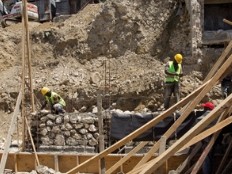|
||||||||||||||||||
| Download the revised decree and electoral calendar, published in the official journal |
|
|
Haiti - Reconstruction : Return and neighborhood rehabilitation (Balance 2012) 13/01/2013 13:47:42
Over the last few decades, the housing sector, in Port-au-Prince and in other Haitian cities, developed mostly informally, without regulatory frameworks or sector policies for the management of urban growth. The earthquake of 2010 shed a crude light on the great vulnerability of Haitians, and the need for safer building practices. In 2012, significant progress was achieved with the support of the United Nations and their many partners working on housing and urban development. key facts and figures 80% of the debris generated by the earthquake has been removed by the Government of Haiti, Haitians themselves and partners (10% of which through UN-supported programmes). (ILO, UNDP, UN Habitat, UNOPS) 200,000 paving stones and 20,000 tiles have been produced out of earthquake rubble and transformed into stairs, corridors, houses. Close to 7,000 people have been trained on safe construction and rehabilitation practices, urban planning and land tenure system in Haiti. Housing solutions provided to a total of 158,833 earthquake affected families.(These include 110,964 temporary shelters build by the E-Shelters Cluster members, 23,233 rental subsidies, 5,911 permanent housing as well as repairs of damaged houses) 99% of beneficiaries who received rental subsidies agree that such support was offered to them at the moment in which they were most in need.(E-shelter cluster) 46,000 residents benefited from infrastructure rehabilitation, through rebuilt “red houses” and repaired “yellow houses” in the neighbourhoods targeted by the 16/6 programme.(ILO, UNDP, UNOPS) In these neighbourhoods, 1.2 km of road and 1.5 km of drainage canals constructed and 400 street solar lights installed. 20 neighbourhood rehabilitation plans developed with communities and training on urban planning provided to community leaders. Operational budget formally allocated from state resources to the National Coordination Unit for Housing and Public Buildings Construction (UCLPB), and draft policy on housing, human settlements and urban development elaborated.(IOM, UN Habitat, UNOPS, World Bank) Information and Technology Unit established within the Ministry of Public Works, Transport and Communication (MTPTC), to monitor its reconstruction projects, and support provided to raise awareness among the population on safe housing construction.(UN Habitat) Challenges and perspectives Key objectives for 2013 include :
HL/ HaitiLibre
|
|
|
Why HaitiLibre ? |
Contact us |
Français
Copyright © 2010 - 2026 Haitilibre.com |





